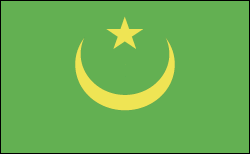Mauritania News & Current Events


Multiparty Democracy and Economic Improvement
In 1984, Col. Maaouye Ould Sidi Ahmed Taya took control of the government. He relaxed Islamic law, fought corruption, instituted economic reforms urged by the International Monetary Fund, and held the country's first multiparty parliamentary elections in 1986. Although the 1991 constitution set up a multiparty democracy, politics remain ethnically and racially based. The primary conflict is between blacks, who dominate the southern regions, and the Moorish-Arabic north, which holds political power. Racial tensions reached a peak in 1989 when Mauritania went to war with Senegal in a dispute over their shared border. As each country repatriated citizens of the other, critics accused Mauritania of taking the opportunity to expel thousands of blacks.
In 1992, Taya won the nation's first multiparty presidential election, which opponents charged was rigged. Taya's attempts to restructure the economy provoked periodic protests, the most serious of which were the bread riots in Nouakchott in 1995.
Racial Tensions Continue
Although Mauritania officially abolished slavery in 1980, the nation continued to tolerate the enslavement of blacks by North African Arabs. In 1993, the U.S. State Department estimated that there were more than 90,000 chattel slaves in the country.
In 2002, the government banned a political party, Action for Change (AC), which has campaigned for greater rights for blacks, calling it racist and violent. Two other opposition parties have been banned in the past few years.
Steps Toward Democracy
Coup attempts in June 2003 and Aug. 2004 were thwarted. Taya's crackdown on Islamists and his support for Israel and the U.S. were believed to have sparked the attempts to overthrow him. In Aug. 2005, however, President Taya was deposed by military officers while out of the country. In June 2006, voters approved to limit the presidency to two five-year terms.
Mauritania started its march toward democracy in November 2006, when local and regional elections were held throughout the country. Presidential elections followed in March 2007. None of the 19 candidates won more than 50% of the vote in the first round, and the two top candidates, Sidi Ould Sheik Abdellahi, a former government minister, and Ahmed Ould Daddah, an opposition leader, faced off in the country's first-ever second round of voting. Abdellahi prevailed in the runoff to become the country's first democratically elected president.
In July 2008, the country's top four military leaders deposed Prime Minister Boubacar and President Abdellahi in a bloodless coup. Some of the same military leaders were involved in the 2005 coup that brought Abdellahi to power. In recent months, the country's legislature has criticized Abdellahi's handling of rising food prices and accused the government of corruption.
In July 2009, a year after taking control of Mauritania in a military coup, Muhammad Ould Abdel Aziz won the presidential election, with 52% of the vote. He prevailed over parliament speaker Messaoud Ould Boulkheir, who garnered only 16%. The election was deemed fair by outside observers, including representatives from the African Union. The election helped to put the country back on a course toward democracy.
When President Abdel Aziz took office on August 5, 2009, Prime Minister Moulaye Ould Mohamed Laghdaf resigned. Laghdaf had been retained two months earlier to serve as prime minster as part of a deal with the opposition. Despite his resignation, Laghdaf was reappointed prime minister by President Abdel Aziz in mid-August 2009. On Feb. 2, 2014, Prime Minister Laghdaf turned in a resignation for his government. The following day he was asked to form a new one.
In the first round of presidential elections on June 21, 2014, incumbent Mohamed Ould Abdel Aziz won 81.9% of the vote, Biram Dah Ebeid 8.7%, Boydiel Ould Houmeid 4.5%, and Ibrahima Moctar Sarr 4.4%. Turnout was 56.5%.
See also Encyclopedia: Mauritania .
U.S. State Dept. Country Notes: Mauritania







